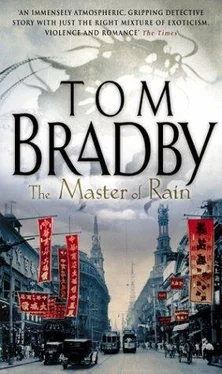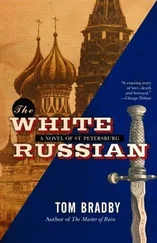“You wish to speak to me?” he asked once the houseboy had gone. He raised his hands and placed them together, two sets of portly, manicured fingers resting against each other beneath his chin. He spoke English well but quietly, with an accent that clipped the ends of some words, but not others, so that “wish” was perfectly enunciated, but “speak” half-lost. His voice was cold.
“About Lena Orlov,” Caprisi said.
“Lena, yes.” He nodded.
“We’re obviously sorry to trouble you about it.”
Lu nodded again. “I spoke to your colleagues in the French police.”
“But we’re conducting the investigation. Excellent as our colleagues are, you would expect us to wish to speak to those involved.”
“How am I involved?”
The houseboy came in with a tray and placed it on a table next to Lu’s chair. Caprisi waited until he had withdrawn. “ ‘Involved’ is perhaps the wrong word. Connected.”
“How am I connected?”
Caprisi shifted uneasily in his seat. “Lena Orlov was living in a flat which we have been led to believe belonged to you.”
Lu frowned, tapping the bottom of his chin with his fingers. “Happy Times block?” he asked himself, as if trying to recall it. “Yes, I believe it is owned by one of my companies. That is all.”
Field could see that, for the Chinese, this was a game. Recalling the hostility in evidence at the Majestic, he wondered how long it would last.
“You didn’t allow Lena Orlov to live there for free?”
“Why would I wish to do that?”
“So she was paying rent?”
“I do not know. Perhaps she had a relationship with one of my men.” He shrugged, to emphasize the extent of his disinterest. “I do not know. I have many companies, many men. I cannot know what is happening with them all.”
“So you did not know her personally?” Caprisi asked, his eyes conspicuously drawn to the photograph of Lena on the grand piano.
“I know many people, Officer.”
“So you knew Lena?”
“This city has many beautiful women to admire.”
There was something in the way he said this-the grotesque satisfaction of a man of humble peasant origins who has risen far enough to buy the right to abuse women he could once never have dreamed of even meeting-that so outraged Field that he had to restrain himself from getting to his feet. He looked at Caprisi and saw a muscle twitching rapidly in the American’s cheek. For the first time he felt naked without his revolver.
His aggression dissipated as he sensed the power of this Chinese man. Field could see how often and with what little consideration death was dispensed with a curt wave of one of those hands.
“So you did know Lena?” Caprisi asked.
“I knew the girl. I know many.”
Caprisi was sweating now and he wiped his forehead and took out his notebook. “Do you mind if I take notes?”
Lu looked unsettled for the first time, waving his hand at them and frowning deeply. “Better not.”
“We are detectives, Mr. Huang.”
“You are police.”
Caprisi left his notebook on his lap but didn’t open it. “Lena Orlov was not, then… You knew her, but she did not… You had no arrangement with her?”
“Arrangement?”
“She was not a concubine?”
He wrinkled his nose in disgust at the idea of having such a formal relationship with a Russian woman.
“There was no relationship?”
“What do you mean relationship?”
Caprisi sighed, leaning forward in his chair. “Mr. Huang, we have no wish to be difficult, but you will appreciate that Lena Orlov was murdered with extraordinary brutality, even by the standards of Shanghai.”
“You don’t like Shanghai?”
Caprisi bent his head.
“We both find it an exciting city,” Field said.
Lu shifted his eyes slowly, looking at Field for the first time. “Exciting, yes.”
“Perhaps the greatest city on earth.”
“Greater than London? Paris? New York?”
“Their equal. An example of harnessing the benefits and strengths of two cultures.”
“Or their faults.” Lu’s face was impassive.
“And their faults.”
“Lena was one of your girls,” Caprisi said more bluntly.
“My girls?” Lu had raised his hand, an ivory bracelet on his wrist trailing down half the length of his forearm. “We spoke a couple of times. I did not know she was living in a flat we owned.”
“You had no idea she lived in the Happy Times block?”
“Why should I know? I cannot know everything.” He smiled at Field, as if now considering him an ally.
“Lena was paying rent?”
He shrugged again, as if this was becoming absurd. “How can I know?”
“But you had met her?”
“Met her? Yes, I’m sure.” He gestured at the photographs. “There are many beautiful women in Shanghai, Officer. I meet many.”
“It is not possible that you-or one of your men-owned her and gave her to someone else? Lent her.”
Lu was still frowning. “My men…” He shrugged.
Field could see this was pointless. He edged forward in his seat and looked across at Caprisi, but the American didn’t move, his face fixed on Lu’s. Field wondered if Caprisi would produce the notes Lena had made but now considered that to do so would be a mistake.
“The doorman of that building… the block owned by your company. He was removed, taken to the Chinese city, and then beheaded.”
“I had not heard it.”
“It does not concern you?”
“Concern me, perhaps. He was a communist?”
“No.”
“Some are too enthusiastic. Many are accused. These are dangerous times.”
“But you had not heard that a doorman of your building was taken away and summarily-”
“I have explained, Officer.” Lu sat up straighter, his tone and manner more menacing. “There are many interests. I believe you will find a company on Bubbling Well Road… the owner of this Happy Times block. I will instruct my men there to cooperate with you.”
Caprisi hesitated, sipping his tea. Field sensed a new, stubborn determination in his colleague.
“So you barely knew Lena?” Caprisi asked.
“I have said. I will instruct my men to help you.”
“I wasn’t asking about your men.”
Field cleared his throat. “Did you know Irina Ignatiev?”
Lu turned to him, his head tilted to one side, as if turning the name over in his mind. He shook his head, once.
“She was murdered two months ago. She was also one of your girls.”
There was silence for a second, then Lu hit the bell twice and there was the sound of footsteps as his bodyguards arrived, two from downstairs, one through the door at the end, all with machine guns.
Field had stood, as had Caprisi. Lu pushed himself to his feet. The game was over. “You challenge me?” He took a pace toward them, his head pushed forward. “You come to my house and challenge me?” He was looking at Chen. His right hand was suspended in midair, and as he cut down with one swift motion, the bald-headed bodyguard stepped forward and swung his machine gun into Chen’s stomach.
“Jesus.” Caprisi stepped toward his colleague.
“Stay.” It was Chen. He was bent double, kneeling, the instruction barked out through the pain.
“For Christ’s sake.”
“Silence,” Chen said, his voice commanding. He slowly stood, straightening with difficulty. No one moved until the Chinese detective had recovered his composure. Once he had done so, he stared at his tormentor.
“Do not come to this house again,” Lu said quietly. “I have tolerated your rudeness long enough.”
Lu waved at his bodyguards to lower their weapons.
The weather had changed while they were inside. The wind had got up, bringing with it a thick bank of cloud, which was advancing on the city like a foreign army. A distant crack of lightning was followed by a loud rumble of thunder. “Typhoon coming,” Chen said once they were back in the car and the first spots of rain were bursting on the windshield.
Читать дальше












